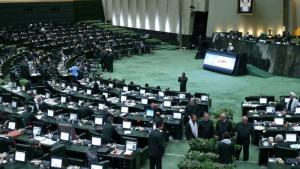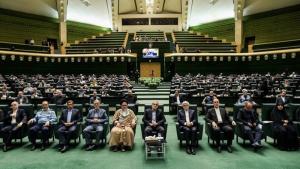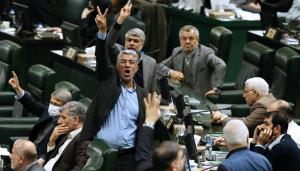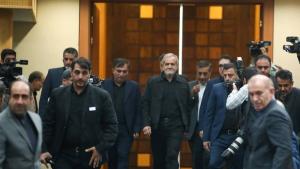(Video) Pezeshkian Cabinet Is Testament to Khamenei's Unquestioned Authority Over Iran’s Government

The recent revelations by Masoud Pezeshkian, the newly appointed president of Iran’s regime, have triggered a wave of backlash within the corridors of power in Tehran. In a desperate bid to secure parliamentary approval for his cabinet, directly by Ali Khamenei.

Pezeshkian entire cabinet list had been approved by Khamenei. “I gave the entire list to the Leader. Everyone came here with coordination and agreement,” he declared, laying bare the fact that the parliament’s role in the approval process was merely performative.

The state-run website Entekhab noted that Pezeshkian’s final defense of his cabinet, with its heavy emphasis on Khamenei’s approval, had angered opponents and critics who accused him of “exploiting” the Supreme Leader’s authority to push his cabinet through.
Shariatmadari demanded," Pezeshkian retracted his statements, warning that they had provided a “pretext and excuse” for critics to “undermine the democracy."
In a desperate bid to secure parliamentary approval for his cabinet, Pezeshkian inadvertently pulled back the curtain on the regime’s sham democracy, confirming that every member of his cabinet was pre-approved by Supreme Leader Ali Khamenei and the regime’s security apparatus.
This rare moment of transparency has provoked outrage and criticism from various factions within the regime, further highlighting the deep-seated authoritarianism at the heart of Iran’s clerical dictatorship.
During his speech in the parliament on Wednesday, August 21, Pezeshkian made the startling admission that his entire cabinet list had been vetted and approved by Khamenei. “I gave the entire list to the Leader. Everyone came here with coordination and agreement,” he declared, laying bare the fact that the parliament’s role in the approval process was merely performative.
This admission did not sit well with many within the regime. Hossein Shariatmadari, the editor-in-chief of the Kayhan newspaper, was quick to condemn Pezeshkian’s remarks. He called them “unrealistic claims” that had been eagerly seized upon by the regime’s “sworn enemies” to discredit the notion of democracy in Iran.
Shariatmadari demanded that Pezeshkian retract his statements, warning that they had provided a “pretext and excuse” for critics to “undermine the republic’s democracy, the parliament’s authority, and even the president’s powers.” He further criticized Pezeshkian for what he described as a “misinterpretation” or “misstatement” of the Supreme Leader’s role in the cabinet selection process.
The backlash extended beyond Kayhan. The state-run website Entekhab noted that Pezeshkian’s final defense of his cabinet, with its heavy emphasis on Khamenei’s approval, had angered opponents and critics who accused him of “exploiting” the Supreme Leader’s authority to push his cabinet through.
The Javan website, an Islamic Revolutionary Guards Corps (IRGC)-run newspaper, reported on the criticism from the spokesperson for the Parliament’s Security Commission, who rebuked Pezeshkian for implying that the ministers required Khamenei’s endorsement to be viable candidates.
This criticism was echoed by MP Malek Shariati, who took to social media to express his concerns about Pezeshkian’s strategy. Shariati warned that leveraging Khamenei’s authority to secure parliamentary approval could backfire if the ministers fail to deliver in the future, potentially placing the blame on Khamenei himself.
Meanwhile, the Jamaran website highlighted a critical note from Manan Raisi, MP from Qom, who questioned whether the vote was for Pezeshkian’s cabinet or “the Leader’s cabinet.” Raisi condemned Pezeshkian’s rhetoric, stating that his approach was inappropriate and unworthy of the office he holds.
Similarly, Vatan-e Emrooz published an editorial titled “Improper Use of the Leader’s Name,” which attributed the parliament’s unanimous confidence vote to Pezeshkian’s repeated emphasis on his coordination with Khamenei. The editorial described Pezeshkian’s approach as a “grave mistake” and called for “rectification.”
However, Ali Motahari, a former Deputy Speaker of Parliament, defended Pezeshkian’s remarks, arguing that they were not an exploitation of Khamenei’s name but rather a “transparent and truthful” account of reality.
Motahari stated, “Pezeshkian informed the representatives that certain ministers were specifically endorsed by the Leader, so they should be aware of this when casting their votes. In my opinion, it is appropriate to avoid any behind-the-scenes dealings.”
Pezeshkian’s emphasis on his coordination with Khamenei represents a stark shift from previous administrations, underscoring the increasingly desperate state of a regime that can no longer tolerate even the slightest dissent amidst mounting challenges at home and abroad.
While it has long been evident that Khamenei wields ultimate authority over all aspects of governance, earlier administrations have either subtly acknowledged this or occasionally clashed with the Supreme Leader’s pervasive influence.
The heightened antagonism during the vetting process, coupled with the ongoing infighting among the regime’s tightly controlled parliamentary factions, government, and judiciary, reveals a fractured and increasingly intolerant system. This internal discord only serves to highlight the regime’s vulnerability as it faces escalating domestic unrest and growing international pressures.
On Tuesday, August 20, the Iranian regime parliament concluded its fourth day of intense vetting for the cabinet nominees of new president Masoud Pezeshkian.
The session, which scrutinized key ministries such as Industry, Culture, and Interior, has revealed the extent to which the clerical regime’s Supreme Leader Khamenei is using his surrogates in the Majlis to shape the composition of the new government.
His objective is unmistakable: to ensure Pezeshkian’s cabinet is purged of any elements that might challenge his authority and are fully aligned with his hardline agenda.
From the outset, it was evident that Khamenei’s influence was the driving force behind the vetting process. Masoud Pezeshkian openly admitted, “None of the proposed ministers were introduced to Parliament without consulting the highest levels of the country.”
This tight control was also evident when Mohammad Atabak, the nominee for Minister of Industry mimicked his peers before him and declared himself a “soldier of the Supreme Leader.” Atabak emphasized that his plans for the ministry were “in line with the general policies of the state and the Seventh Development Plan,” committing to “neutralize the impacts of the sanctions.”
Infighting and Rivalry
During the vetting of Abbas Salehi, the nominee for Minister of Cultural Heritage, Tourism, and Handicrafts, the session descended into chaos when pamphlets accusing Salehi of mishandling a critical security case involving regime insiders were circulated among MPs.
These pamphlets detailed Salehi’s actions as head of intelligence in Khuzestan, where he allegedly punished loyal regime members through forced confessions and severe mistreatment.
The distribution of these pamphlets sparked outrage, prompting Parliament Speaker Mohammad Bagher Ghalibaf to condemn the act as illegal and in violation of parliamentary procedures.
Ghalibaf’s critical reaction ignited a heated verbal exchange among MPs, with some lawmakers storming the podium to confront the Speaker and each other.
The argument became so intense that it disrupted the session, forcing Salehi to pause his defense. Salehi, clearly agitated by the turmoil, decried the situation, saying, “In this atmosphere, it’s impossible to speak properly.”
Despite Ghalibaf’s attempts to restore order, the session continued to be marked by sharp exchanges and accusations, reflecting the deep-seated rivalries and mistrust within the regime.
Adding to the tension, Salehi was further criticized for his controversial remarks about the 2009 election fraud allegations. He had previously questioned, “If it was predetermined who would win, why mock the people and impose such a heavy cost on the system?”
These statements, coupled with allegations that Salehi had threatened other MPs with “consequences” if they did not support his nomination, intensified the opposition against him.
The incident highlighted the fierce infighting among regime factions, as they use the vetting process to undermine rivals and solidify their power, all while Khamenei tries to maintain a firm grip on the government’s formation.
Furthermore, MP Ali Khezrian took a harsh stance against Hussein Simayi Sarraf, the nominee for Minister of Science, Research, and Technology. Khezrian criticized Simayi Sarraf for his past affiliations and actions, specifically targeting his involvement as a legal advisor during the contentious 2009 election aftermath.
Khezrian warned that “individuals who accused the state of election fraud in 2009 and have not shown remorse are unfit to hold key positions.” This statement was a direct attack on Simayi Sarraf’s loyalty, further demonstrating the rivalry as factions continue to weaponize past controversies to discredit each other during the vetting process.
Amidst the political maneuvering, some nominees were forced to confront the harsh realities facing the country, which they could not even ignore. Hossein Simayi Sarraf, the nominee for Minister of Science, Research, and Technology, gave a sobering account of the dire state of Iran’s educational institutions. “The state of our universities is far from well; according to a recent study, 30% of students need mental health services,” he admitted.
Similarly, during the vetting of Abbas Salehi, the nominee for Minister of Culture and Islamic Guidance, MPs focused not on his qualifications but on his perceived loyalty to the regime’s ideological tenets, particularly the enforcement of “chastity and hijab” laws. “The primary concern for the Ministry of Culture must be the strict enforcement of ‘chastity and hijab’ regulations,” one MP insisted.
The parliamentary vetting process has revealed a regime in turmoil, deeply divided by infighting and struggling to maintain its grip on power. Khamenei’s tight control over the cabinet formation, coupled with the bitter rivalries among his loyalists, underscores the fragility of his rule.
Despite the recent death of Ebrahim Raisi, Khamenei is determined to push through a purged and compliant government, exposing just how vulnerable his regime has become in the face of mounting domestic and international challenges.
The untouchables
During the vetting process, certain proposed ministers were effectively untouchable due to the explicit backing of Supreme Leader Ali Khamenei, which deterred MPs from challenging their nominations.
Abbas Amir Faree, a political activist from the principlist faction, remarked that the parliament, “thanks to the Supreme Leader’s guidance, is fully cooperating, especially with those ministers who have received his endorsement.”
He specifically noted that the nominees for key ministries such as Interior, Intelligence, Foreign Affairs, and Defense were certain to receive overwhelming support due to Khamenei’s approval.
Even the nominee for Education, closely associated with a high-ranking IRGC commander, faced no opposition, with MPs acknowledging his religious credentials and loyalty to the regime.
Faree contrasted this with the expected rejection of other nominees, like the candidate for Minister of Oil, who lacked such backing and was criticized for his ties to former officials deemed less favorable by the Supreme Leader.
On Wednesday, August 21, the clerical regime’s parliament convened to vote on the proposed ministers of Masoud Pezeshkian‘s cabinet, with all nominees ultimately receiving the Majlis’ approval.
The session, however, was less about democratic unanimity and more about the blatant orchestration of power by Supreme Leader Ali Khamenei, as illustrated by Pezeshkian’s admissions.
Pezeshkian went as far as to admit that every significant decision, including the selection of ministers, was made in direct consultation with the “higher levels,” a clear reference to Khamenei.
He confessed, “The proposed ministers were coordinated with all relevant committees, both ‘below’ and ‘above’ [referring to Khamenei]. I want to say that we coordinated before we came here. You should accept all of these individuals from us.”
Regarding Abbas Araghchi, the proposed Minister of Foreign Affairs, Pezeshkian highlighted Khamenei’s early approval, saying: “Dr. Araghchi was the first person whom the Leader approved even before we announced the names of the ministers. This wasn’t something we made up don’t make me go into the details of the matter.”
Pezeshkian recounted how Abbas Salehi, the proposed Minister of Culture and Islamic Guidance, refused to join the cabinet until Khamenei picked up the phone and ordered him to accept the position.
Similarly, Khamenei explicitly directed the inclusion of Farzaneh Sadeq as the Minister of Roads. Pezeshkian’s repeated references to Khamenei’s involvement” Why are you forcing me to say things that shouldn’t be said?” only serve to underscore the pretense of a parliamentary process, revealing it as merely a rubber stamp for decisions already made by the Supreme Leader.
Vows of allegiance
During the four-day vetting process, several of the proposed ministers, even those not traditionally aligned with the so-called hardline faction, made strong declarations of their loyalty to the Supreme Leader Ali Khamenei.
Mohammad Atabak, the proposed Minister of Industry, Mines, and Trade, explicitly referred to himself as a “soldier of the Velayat” [Supreme Leader] during his speech in parliament while Ahmad Meydari, the proposed Minister of Labor, was described by MP Rahmatollah Nowruzi as someone who has “complete faith in the Velayat-e Faqih.”
Abbas Araghchi, the proposed Minister of Foreign Affairs, who received broad support from the so-called reformist faction, made a strong declaration in his speech: “If you trust me as the Minister of Foreign Affairs, I, Seyed Abbas Araghchi, will be a soldier of the Velayat, a minister of the government, accountable to the parliament, and a guardian of the nation’s interests, representing them appropriately abroad.”
Mohammad-Reza Zafarghandi, the proposed Minister of Health, was supported by MP Ahmad Bigdeli, who passionately declared: “I swear by the blood of my martyr father that Zafarghandi has practical adherence to the Velayat-e Faqih,” further asserting the minister’s loyalty.
Mohsen Paknejad, the proposed Minister of Oil, began his speech by paying homage to IRGC Quds Force’s slain commander Qassem Soleimani, expressing wishes for Khamenei’s long life, and affirming that his actions would adhere strictly to the policies outlined by the Supreme Leader. Paknejad emphasized that his performance would be within the framework of Khamenei’s directives.
Internal conflict
Taking on social media on Wednesday, MP Malek Shariati criticized Pezeshkian for leveraging Khamenei’s authority to secure parliamentary approval, warning that this strategy could backfire if ministers fail to deliver in the future, potentially placing the blame on Khamenei himself.
Yet, despite such critiques, the parliament, dominated by hardliners and those loyal to Khamenei, gave its full support to the cabinet, revealing the farcical nature of the proceedings.
Social Impact
Pezeshkian’s administration, which he describes as fully aligned with Khamenei’s policies, was not born out of popular will but out of necessity for the regime to maintain its hold on power.
Following the death of Khamenei’s loyal hand, Ebrahim Raisi, and after the overwhelming boycott of the sham elections by the Iranian people estimated at over 88%, and the subsequent appointment of Pezeshkian and his cabinet, reflect a deep disconnect between the regime and the populace.
The protests and unrest that have continued across the country even as Pezeshkian’s cabinet was being confirmed indicate a society that has moved beyond the pretense of political engagement with the regime’s charades.
Khamenei’s direct control over the appointment of ministers, as openly admitted by Pezeshkian, underscores the fragile state of a regime that can’t afford even the slightest disagreement at the top.
The notion of competing factions within the regime is exposed as a superficial dualism, masking the reality that true power remains concentrated in the hands of a few, with Khamenei at the apex.
The regime’s legitimacy, already severely undermined by widespread election boycotts, faces further erosion as the Iranian people increasingly see through the facade of governance and direct their demands not at reform but at the fundamental dismantling of the existing power structure.
The cabinet formed under these circumstances is less a new beginning and more a continuation of the status quo, with all the limitations and challenges that it entails for a regime facing growing domestic and international pressures.
If you wish to receive the NCRI weekly Newsletter, please use the following link to subscribe: https://bit.ly/3SMgEla.
Shahin Gobadi
NCRI
+33 6 61 65 32 31
email us here
Khamenei's objective is unmistakable: to ensure Pezeshkian’s cabinet is purged of any elements that might challenge his authority and hardline agenda.
Legal Disclaimer:
EIN Presswire provides this news content "as is" without warranty of any kind. We do not accept any responsibility or liability for the accuracy, content, images, videos, licenses, completeness, legality, or reliability of the information contained in this article. If you have any complaints or copyright issues related to this article, kindly contact the author above.


